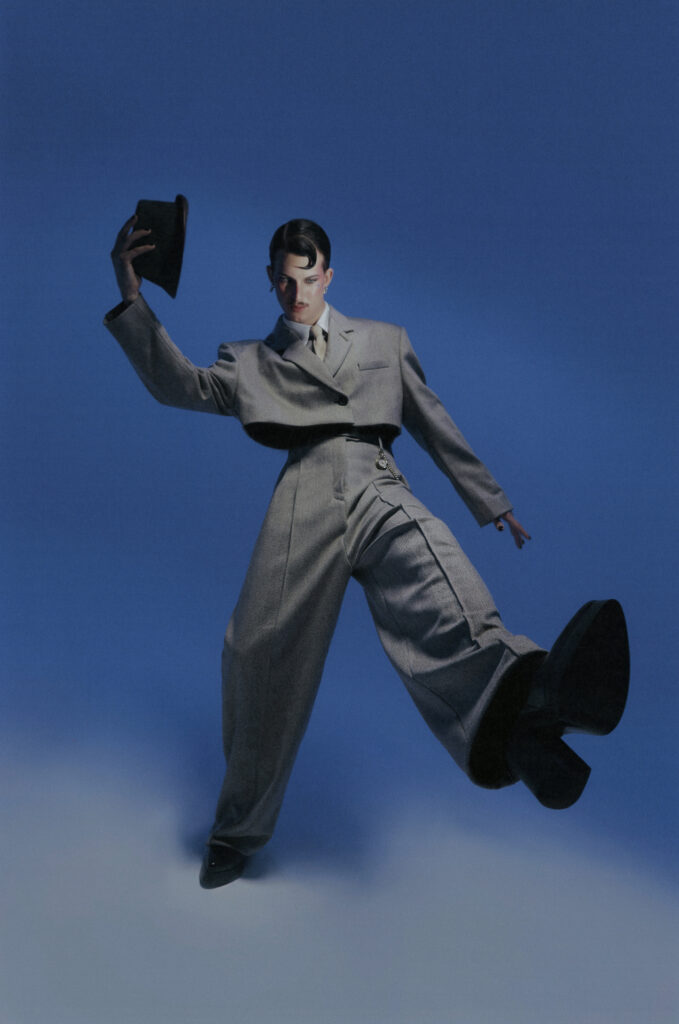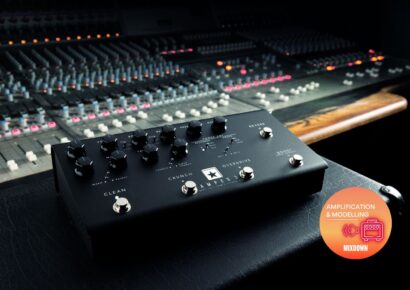Bedroom pop savant Gus Dapperton chats to Mixdown, hot off the release of his excellent new record 'Henge'.
In most cases, the term “solo artist” isn’t one that’s meant in a literal sense – particularly in the world of pop music, where multiple producers and co-writers will form a collective village behind an artist putting music out solely under their own name. Indie-pop wunderkind Gus Dapperton is a breath of fresh air in many ways, but one of the key ones is that he asserts considerable agency over his solo music – he’s writing the songs, he’s producing them and he’s playing the lion’s share of instruments that you hear on them, too. Not only that, but he’s always seeking new ways to adapt and evolve his creative process – as his newest studio album, Henge, is testament to.
Read up on all the latest features and columns here.
“When I’m making a song, I really tend to see it all visually mapped out,” Dapperton explains. “The part that I really love, once the structure is there, is discovering the certain sounds that will make the song what it is. The way that I get there is always changing; I like to go into each album with a different approach. For my last album, Orca, I would write everything on the guitar and take it into the studio with very minimal production. For Henge, I started writing down song names before I’d even written a note of the music. I wanted to use those titles to guide the mood, and I found that approach to be really stimulating and exciting.”
Dapperton points to the album’s opening and closing moments to exemplify his approach on Henge: ‘Sunset’ and ‘Sunrise’. The former is a dramatic build of guitar arpeggios and distorted, synthesized vocals, emoting that swell into spiralling pop shuffle; the latter is a stirring, piano-driven moment of ambience guided by the voice of Vietnamese-American poet Ocean Vuong.
“In certain times of the year in New York, the sun lines up perfectly with the buildings and creates this crazy sunset solstice,” Dapperton.
“That’s called the Manhattanhenge, which I named the album after. That’s why I wanted to open the album with ‘Sunset’ and close on ‘Sunrise’: The album is its own weird little underworld, and the concept is basically me trying to escape it. I never would have been able to write a song like ‘Sunset’ if I didn’t approach the making of this album the way that I did. It would have been hard to make otherwise. It wouldn’t have made sense on an album like Orca.”

Gus Dapperton “Horizons” Henge Warner
Orca was Dapperton’s second album, released towards the tail-end (pun intended) of 2020. He knows what you’re thinking, by the way, and he agrees: He really should have waited to use that title, following the titular animal’s oceanic uprising. “I should make a TikTok or something where I tell everyone that I called it three years before it happened,” he laughs. Back to the album itself, it’s worth noting it was put out at a time when COVID still had a considerable stranglehold on the world at large. Throw a global pandemic into the mix of pre-existing exhaustion following the completion of Orca, and Dapperton describing his then-mindset as “drained and uninspired” becomes completely understandable.
“It took me a long while to get back into the swing of it,” he says. “Orca was such a big release of tension. It was very therapeutic – at that time in my life, I was honestly just writing songs to cope. When COVID happened, I really found myself debating what the purpose of me making music was. What was my place in it all? That’s why, with making Henge, I really wanted to make something that was as cohesive as it was conceptual. I wanted to push the boundaries of my own music, and hopefully inspire others to do the same when they heard the album.”
The boundary pushing in question began with a blank slate, as Dapperton intentionally chose to not use any of the instruments that he played on his previous albums. When he speaks of discovering sounds, it’s here where they take their most tangible form. “I wanted a lot of jazzy, clean guitar tones,” Dapperton begins. “That came with getting this new gorgeous hollow-body guitar – which came in particularly handy for ‘Sunset’. The drum sounds are really different on this album, too – Orca was all live drums, whereas all the sounds I used for Henge were entirely in the box. A lot of the keys and the synths that you’re hearing, that was all done on a Prophet-6, the Dave Smith instrument. I was really inspired by 80s music, as well as the early eras of jazz, so I wanted to use instrumentation that represented those worlds to me.”
The creation and subsequent release of Henge has clearly lit a fire under Dapperton from a creative standpoint – so much so, that he’s already working to make sure it’s not another three years before his fourth album comes out. “I’ve been making a lot of beats, actually – just to change up the approach again,” he says. “I’m making the full instrumental beat first, and then writing around that. Now I’m back into writing, I’ve been going really hard at it.” He signs off with dreams that people hearing Henge are inspired to lift themselves up should they need it: “It’s so important to express yourself,” he says, “and I hope that people take that away from this album.”
Gus Dapperton’s Henge is available on all good streaming platforms now.

